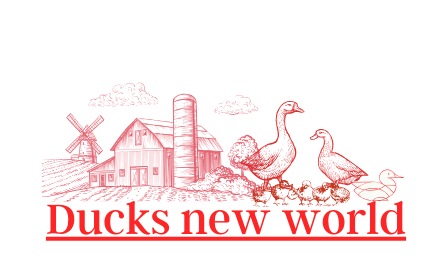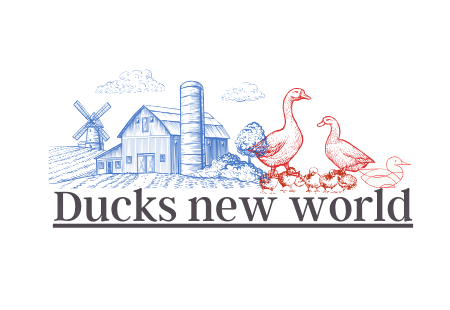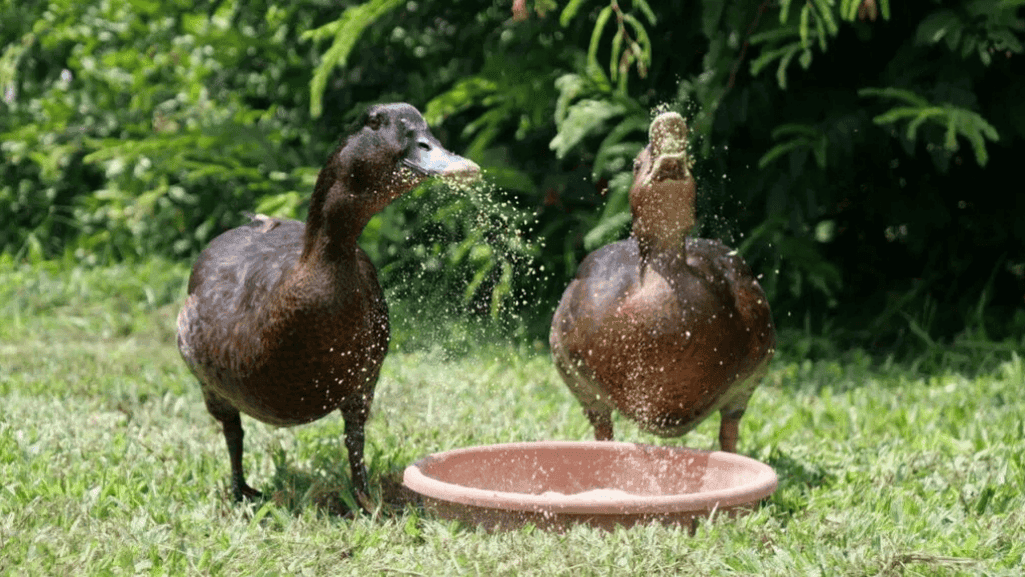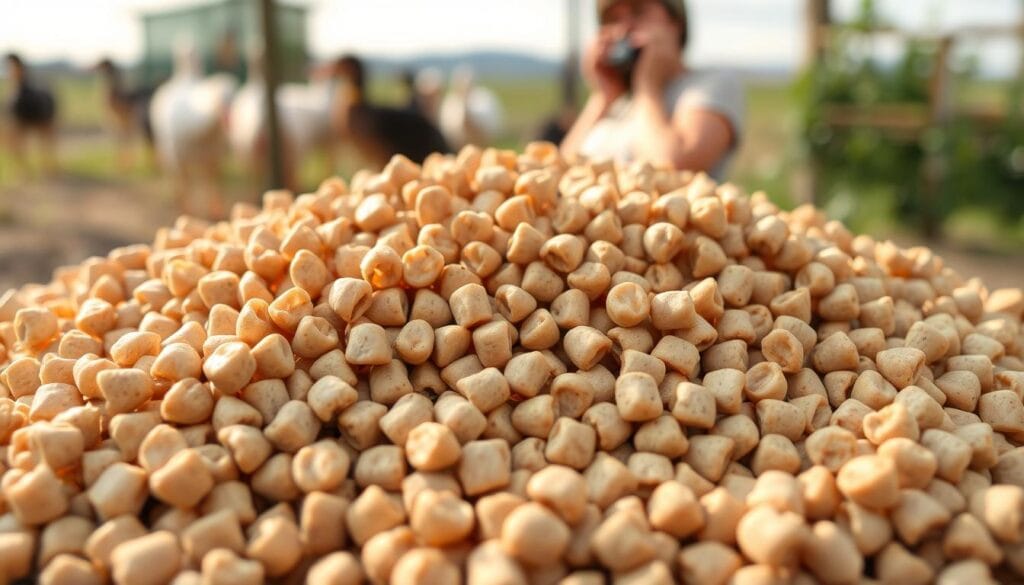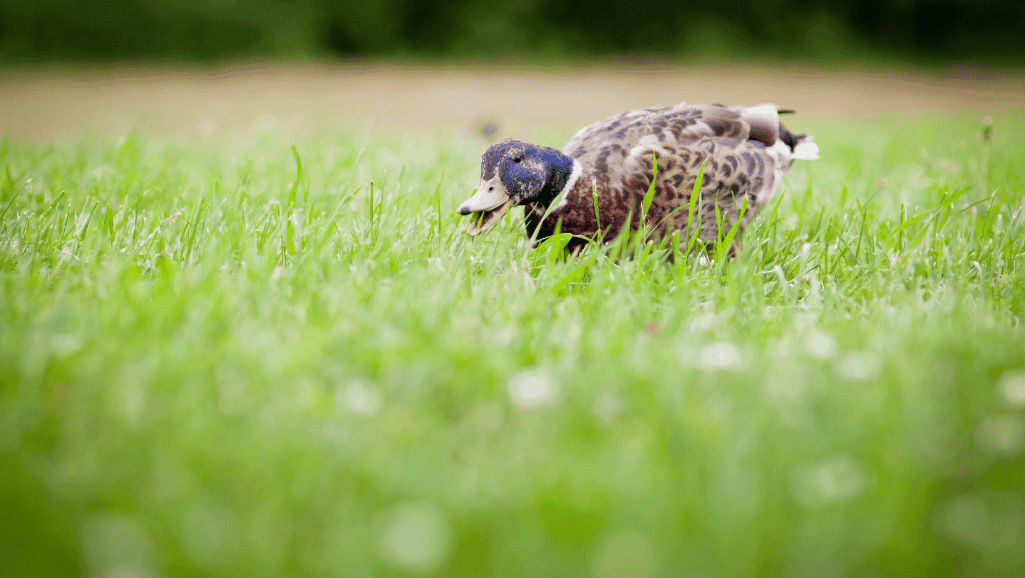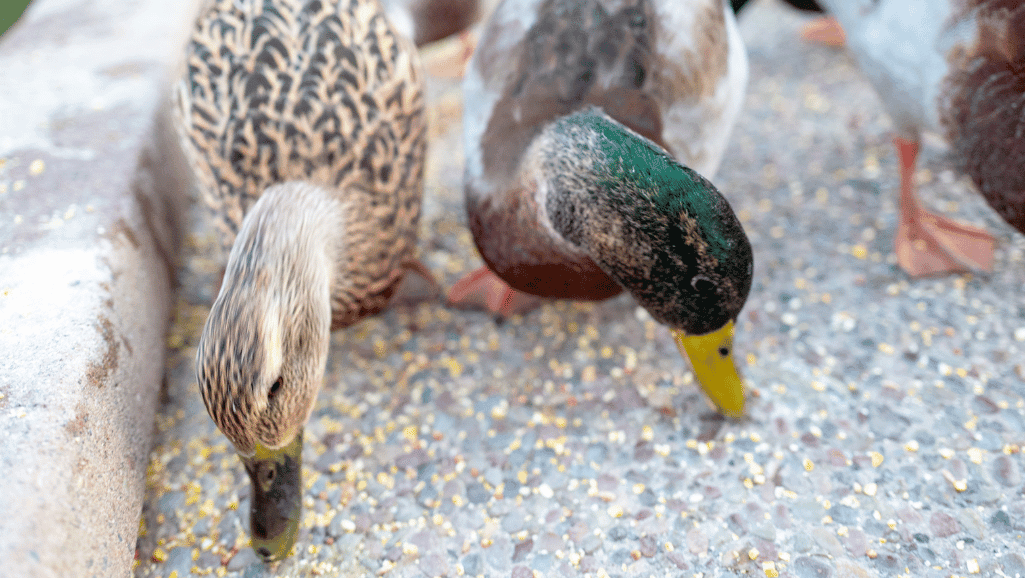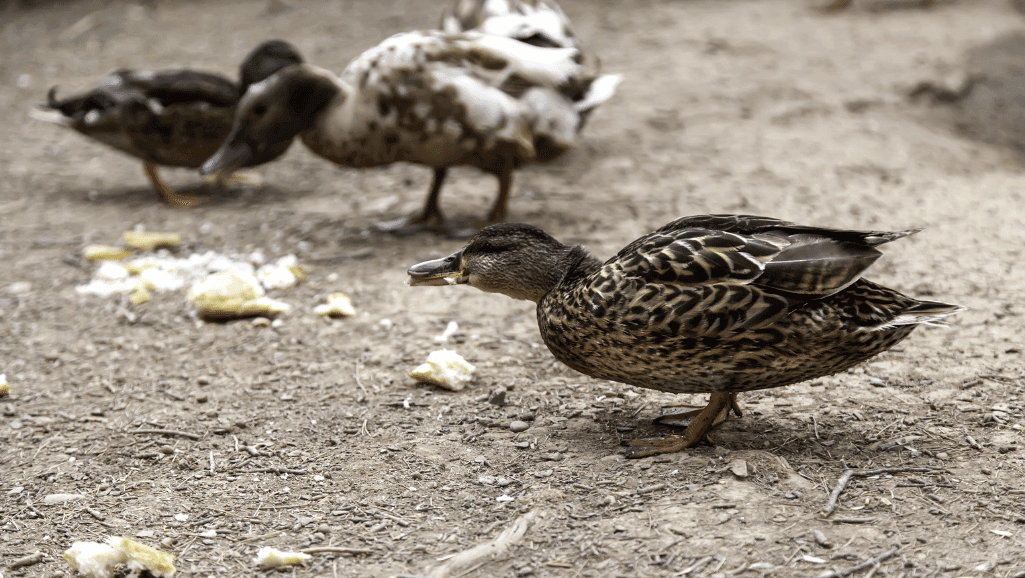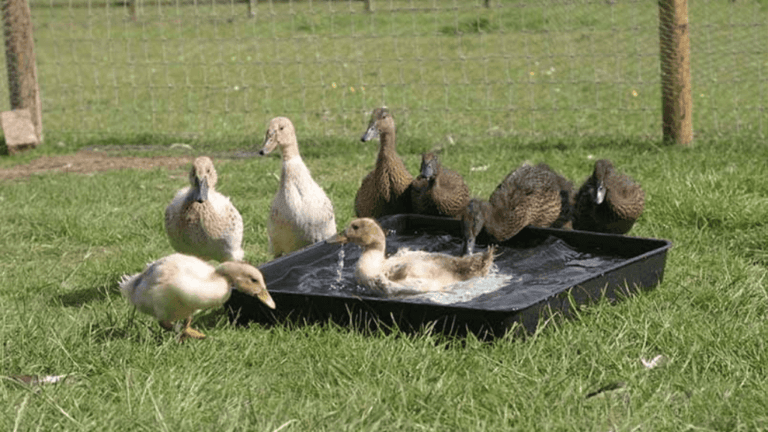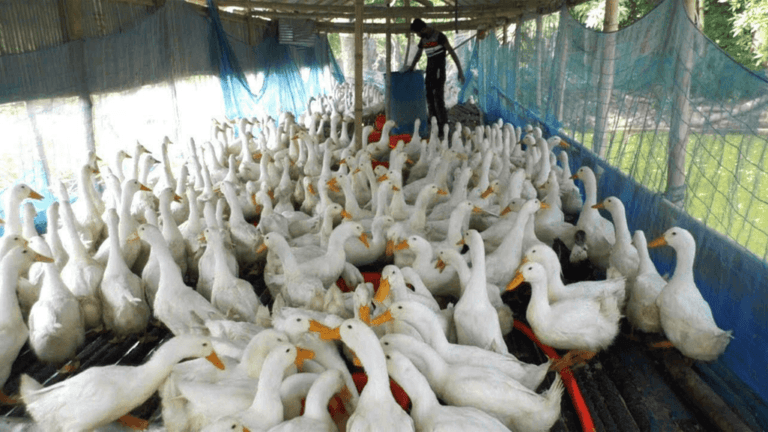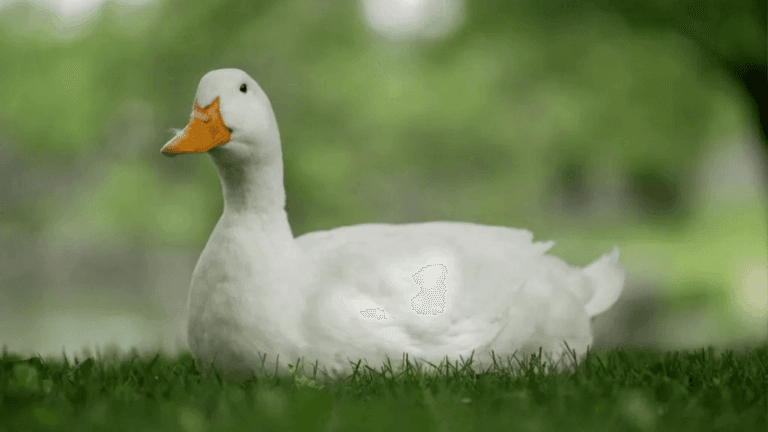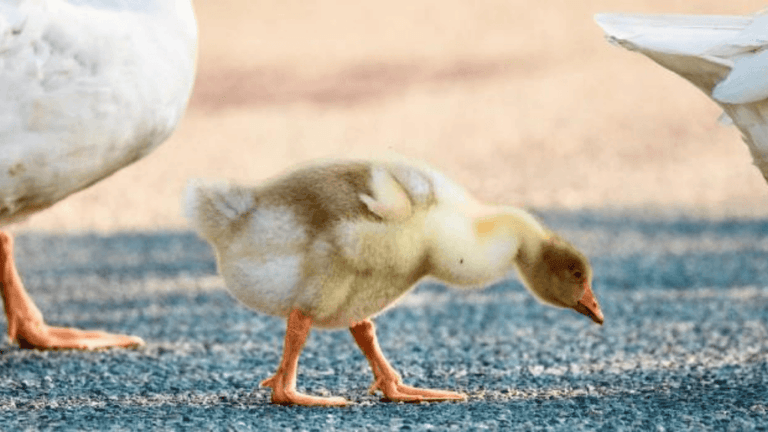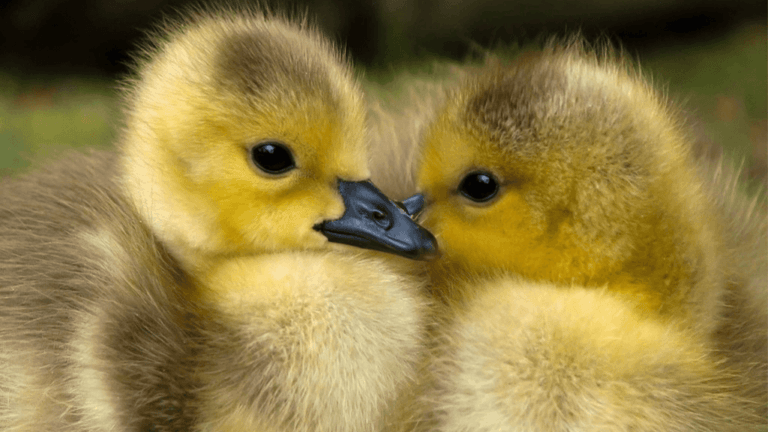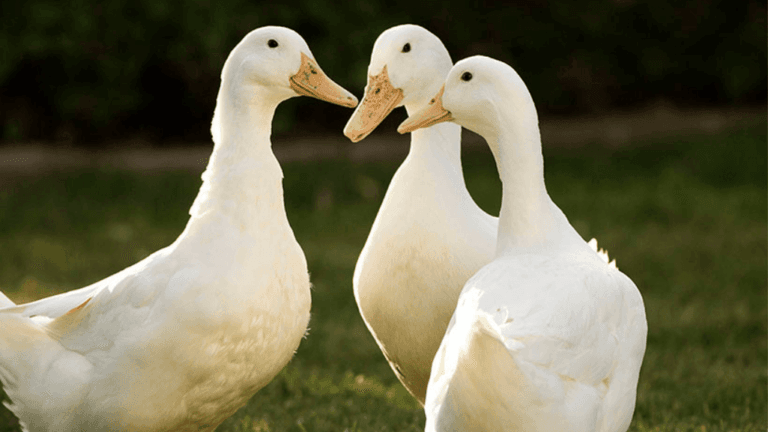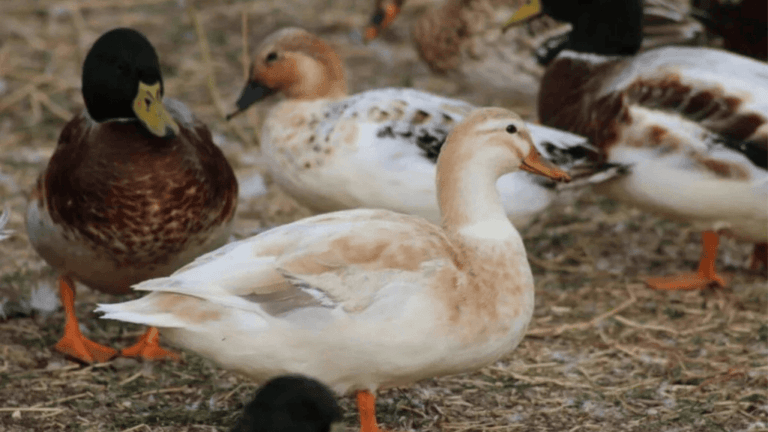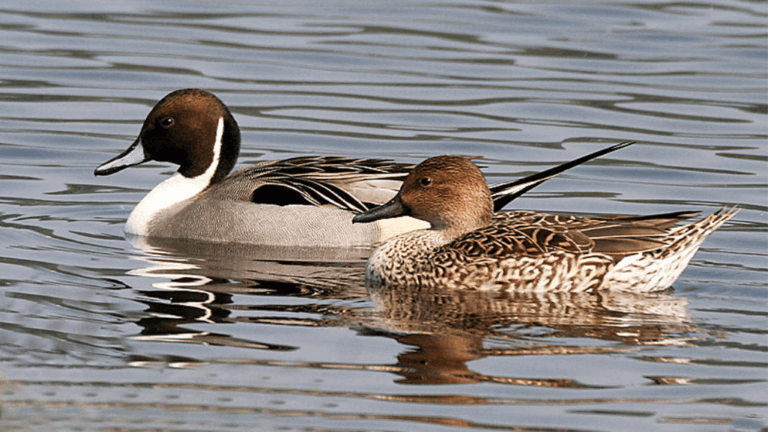Ducks are fascinating creatures with diverse dietary needs. As a responsible duck owner, it’s crucial to provide them with the best nutrition. Whether you’re raising ducks for eggs, meat, or as pets, knowing their nutritional needs is key. In this guide, we’ll explore duck food options, from commercial feeds to natural foraging, to help you nourish your feathered friends.
Ducks are omnivores, eating a wide range of foods. In the wild, they eat aquatic vegetation, insects, seeds, and grains. During summer, they eat protein-rich larvae and insects. In winter, they eat seeds, aquatic plants, and grains.
Domestic duck nutrition is crucial. It’s important to provide a balanced diet at different life stages. Duck feed comes in starter, grower, and breeder formulas. These feeds have the right balance of nutrients for growth and egg production. By choosing quality waterfowl feed and adding natural foods, your ducks will thrive.
Key Takeaways
- Ducks are omnivores with diverse dietary needs that change throughout the seasons and their life stages.
- Commercial duck feeds are formulated to meet the specific nutritional requirements of ducks at different ages.
- Providing a balanced diet that includes high-quality duck pellets, natural foraging opportunities, and healthy treats is essential for optimal duck health.
- Ducks require access to fresh, clean water for drinking and maintaining proper hygiene.
- Overfeeding or providing inappropriate foods can lead to health issues, so it’s crucial to monitor your ducks’ diet closely.
Understanding Duck Nutrition
It’s key to give your ducks a balanced diet for their health and happiness. Knowing what ducks need nutritionally is important. Their diet affects their growth and overall well-being.
Protein Requirements for Ducks
Protein is vital for ducks. It helps with muscle growth, feather health, and egg laying. Ducks need different amounts of protein at different life stages. For example, ducklings need more protein to grow fast.
As they get older, their protein needs go down a bit. Good sources of duck protein include:
- High-quality commercial duck feed
- Insects, such as mealworms and crickets
- Aquatic invertebrates, like snails and small crustaceans
- Plant-based proteins, such as legumes and seeds
Essential Vitamins and Minerals
Ducks also need various vitamins and minerals for health. Important ones include:
- Vitamin A: Helps with eye health, immune function, and reproduction
- Vitamin D: Important for bone health and calcium absorption
- Vitamin E: Acts as an antioxidant and boosts the immune system
- Calcium: Essential for strong bones and eggshells
- Phosphorus: Helps with bone growth and metabolism
Using a balanced commercial duck feed or adding nutrient-rich treats can help meet these needs.
Importance of a Balanced Diet
A balanced diet is crucial for your ducks’ health. A diet lacking essential nutrients can slow growth, reduce egg laying, and make them more prone to illness. A well-balanced diet, however, supports:
- Healthy growth and development
- A strong immune system
- Good feather health
- More eggs from laying ducks
- Better reproductive health
By understanding your ducks’ nutritional needs and feeding them well, you can help them live a happy, healthy life.
Commercial Duck Feed
Commercial duck feed is a great choice for your ducks’ nutrition. It’s made for ducks and has all the nutrients they need. You can choose from duck pellets, waterfowl pellets, and floating feed pellets to find the best one for your ducks.
Starter, Grower, and Breeder Formulas
Duck feed comes in different formulas for each stage of a duck’s life. Starter formulas have 18-20% protein for ducklings. Grower formulas are for ducks that are almost full-grown. Breeder formulas have less protein but more calcium for laying eggs.
While ducks can eat chicken feed, it’s better to avoid medicated feed. Purina has a range of duck feed that meets their needs at every stage, keeping them healthy and strong.
Choosing High-Quality Duck Feed
Choose high-quality duck feed for your backyard ducks. Look for feeds with wholesome ingredients and no fillers or artificial additives. This ensures your ducks get the nutrients they need to thrive.
Consider the feed’s form too. Pellets are better than crumbles or mash because they reduce waste. Floating feed pellets are great because they help ducks eat naturally and keep the water clean.
Ducks need more feed than chickens, especially when they’re laying eggs. So, it’s important to give them a high-quality, nutrient-rich feed.
By choosing high-quality commercial duck feed, you ensure your ducks get the right nutrition. With different formulas for each stage, you can tailor their diet to meet their needs. This helps them stay healthy and happy in your backyard.
Natural Food Sources for Ducks
It’s key to give your ducks a balanced diet with natural foods. Ducks eat aquatic plants, seeds, insects, and small animals. By giving them natural duck feed options, they get the nutrients they need.
Aquatic Vegetation and Plants
Ducks enjoy eating aquatic plants and greens. Wild rice, wild celery, and pondweed are great choices. These plants give them vitamins, minerals, and fiber.
Duckweed is also a good choice. It’s a fast-growing plant that can be a cost-effective feed. Studies show it helps ducks grow healthy.
Insects, Snails, and Small Aquatic Creatures
Ducks eat insects, snails, and small aquatic animals in the wild. These foods are rich in protein. They help keep ducks’ muscles strong and their immune system healthy.
Amphibians like frogs and tadpoles are also part of their diet. They provide important nutrients and help balance the pond ecosystem.
Seeds, Grains, and Berries
In the cold months, add seeds, grains, and berries to their diet. These treats give them energy and keep them warm. Oats, rice, and sweetcorn are good choices.
But avoid bread. It’s not nutritious and can cause health problems. Instead, give them a mix of natural foods and high-quality commercial feed.
By offering your ducks a diverse array of natural food sources, you can help them thrive and enjoy a happy, healthy life on your farm or in your backyard.
Supplementing Your Ducks’ Diet
A balanced commercial duck feed is key for your ducks’ diet. Adding nutritious duck treats can make mealtime exciting. It also ensures they get all the nutrients they need.
Healthy Treats for Ducks
Choose treats that are full of nutrients and match their natural diet. Good options include:
- Cracked corn
- Oats
- Rice
- Birdseed
- Frozen peas
- Chopped lettuce
- Sliced grapes
Remember, treats should not make up more than 10% of their diet. This keeps their nutrition balanced.
Fruits and Vegetables Ducks Enjoy
Ducks enjoy a variety of fruits and vegetables. These provide vitamins, minerals, and fiber. Some good options are:
- Lettuce
- Cabbage
- Corn (not popcorn)
- Peas
- Broccoli
- Tomatoes
- Most fruits (except citrus)
Adding these as treats can keep your ducks healthy and happy.
Avoiding Unhealthy Snacks
It’s important not to give ducks unhealthy snacks. Bread, crackers, and junk food have no nutritional value. They can cause malnutrition and harm if eaten too much.
Bread is basically like giving ducks candy – empty calories that fill them up without providing proper nutrition.
By focusing on a balanced diet with nutritious treats and fresh veggies, your ducks will thrive.
Duck Food for Different Life Stages
As your ducklings grow, their diet needs change. This is important for their health and growth. Commercial duck feed is made for ducklings, growers, and breeders. It’s key to their diet.
Ducklings need a lot of protein, about 20-22%, in their starter feed. This helps them grow fast in the first 2-8 weeks. But, too much protein can cause Angel Wing, where their wings twist outwards.
A balanced diet for pet ducks should include a variety of vitamins such as A, D, E, and K to support their immune system, vision, and bone health.
When ducks grow up, they need less protein. Grower feed has 17-19% protein. This helps them grow without too much. Minerals like calcium and phosphorus are also important for strong bones.
Adult ducks, especially those breeding, need special feed. This feed has about 16% protein and 3% calcium. Calcium is key for strong eggshells.
Duck supplements can help fill nutritional gaps. But, avoid foods high in salt, sugar, and fats. These can cause health issues like dehydration and obesity.
Water is also crucial for ducks. It’s important for their health, hygiene, and digestion. Make sure they always have clean, fresh water.
Understanding your ducks’ changing needs and feeding them right helps them thrive. This way, they can live a happy, healthy life with you.
Ensuring Access to Fresh Water
When caring for backyard ducks, it’s key to provide clean drinking water. Ducks need fresh water for digestion, preening, and health. Giving them access to clean duck drinking water boosts their happiness and life span.
Importance of Clean Drinking Water
Ducks love water and often play in it. But, this can make the water dirty and harmful. It’s important to change their water often and keep waterers clean to stop disease.
Ducks also use water for preening, which keeps their feathers in good shape. Clean water is essential for this. Dirty water can ruin preening and cause feather issues.
Maintaining Proper Hygiene in Water Sources
Keeping water sources clean is vital for your ducks’ health. Clean and disinfect their waterers and check ponds or pools regularly. This helps prevent disease and keeps your flock healthy.
Make sure ducks have water deep enough to fully submerge their heads. This helps them clean their eyes, nostrils, and throats. Use shallow dishes for ducklings but deeper pools or ponds for adults.
By focusing on clean water and hygienic sources, you create a healthy environment for your ducks. A bit of extra effort in keeping water fresh will greatly benefit your feathered friends.
Common Mistakes in Feeding Ducks
We all love watching ducks and sharing food with them. But, it’s key to know the mistakes we make. Overfeeding, underfeeding, and giving the wrong food can harm ducks a lot.
Feeding ducks bread is a big mistake. It seems harmless but bread has no good nutrients for ducks. Too much bread can cause malnutrition and even deformities like Angel Wing, which affects their wings.
Overfeeding and Underfeeding
Feeding ducks too much, even healthy food, can cause health problems. It also pollutes the water. Leftover food can rot and grow harmful algae, harming other wildlife. Not feeding enough can also harm their growth and health. It’s vital to give them the right amount of food for their needs.
Providing Inappropriate Foods
There are many foods we shouldn’t give ducks. Avoid junk food, popcorn, citrus fruits, and moldy or rotten food. Choose natural, healthy foods and feed them just enough. Good options include:
- Leafy greens like kale, spinach, and lettuce
- Peas, corn, and birdseed
- Oats and cracked corn
- Insects and small aquatic creatures (for ducks in the wild)
By avoiding these mistakes and picking the right food, we help ducks stay healthy and happy. Remember, we have a big role in keeping ducks well. By making smart choices about their food, we help them thrive in their homes.
Conclusion
Feeding your backyard or pet ducks the right food is crucial for their health. Knowing what ducks need at different ages helps a lot. Choose high-quality commercial feed and add natural foods for a balanced diet.
Adding veggies and fruits as treats is great, but do it carefully. Avoid giving them bread, as it’s bad for their health. It can cause malnutrition.
Make sure your ducks always have clean, fresh water. Keeping their water sources clean is also important. Avoiding common mistakes like overfeeding helps a lot.
By following these tips, you can ensure your ducks are happy and healthy. A balanced diet is key to their well-being. Enjoy watching your ducks grow and thrive in your care.
